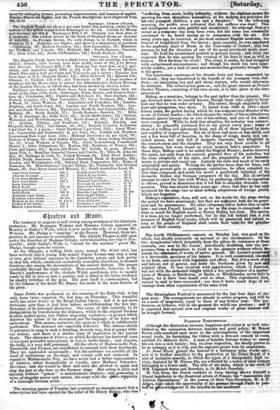Since Yidelio was performed on the occasion of the State
visit, it has only been twice repeated, the last time on Thursday. This beautiful work has never drawn at the Royal Italian Opera ; and it is not more fortunate now than it had been before, notwithstanding the fine per- formance of its principal characters. One cause of this certainly is, its disfiguration by transforming the dialogue, which in the original German is plain spoken prose, into Italian aing-song recitative,—a process which deprives the action of its movement and the language of its force and earnestness. This season, moreover, the opera as a whole is indifferently performed. The choruses are especially defective. The famous chorus of prisoners is sung in such a drawling, slovenly way, that it passes with- out notice; and there is a similar want of expression in the' joyous finale. The character of Pizarro, on which Beethoven has bestowed some of his most powerful coneeptinna, is lost in feeble hands; and Jaquino, the buffo, is a very dull personage. All the efforts of Mademoiselle Ney, Tamberlik, and Formes, are insufficient to contend with these drawbacks. They are applauded occasionally ; but the audience are sensible of the want of earnestness on the Stage, and remain cold and unmoved. In regard to Mademoiselle Ney, we have never had a better representative of Loonora, either dramatically or vocally, since Madame Sehreeder- Devrient; and she would be finer still were she allowed to speak and sing the part as she does on the German stage. Her acting is prain and natural, without "points" or melodramatic displays; and ing a voice of singular power and extent, she sings with the c4lIdte simplicity ot a thorough German artist.


































 Previous page
Previous page